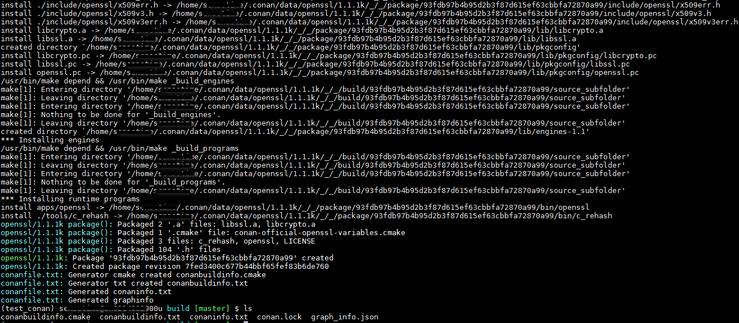Conan客户端简单使用示例
Posted fengbingchun
tags:
篇首语:本文由小常识网(cha138.com)小编为大家整理,主要介绍了Conan客户端简单使用示例相关的知识,希望对你有一定的参考价值。
在https://blog.csdn.net/fengbingchun/article/details/118443862 中对Conan进行了简单介绍,这里调用openssl的接口,写一个简单的test来说明Conan的使用步骤:
(1).首先添加一个conanfile.txt文件,内容如下:依赖项为openssl最新版1.1.1k
[requires]
openssl/1.1.1k
[generators]
cmake(2).依次执行如下命令:
mkdir build
cd build
~/Disk/anaconda3/envs/test_conan/bin/conan install .. -s arch=x86_64 -s compiler=gcc -s compiler.libcxx=libstdc++ -s compiler.version=4.9 -s os=Linux --build=missing执行结果如下图所示:openssl生成的库和头文件会存放在~/.conan/data/openssl/1.1.1k/_/_/package/93fdb97b4b95d2b3f87d615ef63cbbfa72870a99目录下。

在当前build目录下还会生成conanbuildinfo.cmake、conanbuildinfo.txt、conaninfo.txt、 conan.lock、graph_info.json 5个文件:
conanbuildinfo.cmake:定义了一些宏和变量,指定openssl库和头文件的所在路径等信息,此文件需要在主CMakeLists.txt中被include。
conanbuildinfo.txt:指定openssl库、头文件、可执行文件所在路径等信息。
conaninfo.txt:指定编译openssl时的配置信息,及哪些openssl选项是开启的。
conan.lock:与connaninfo.txt内容类似。
graph_info.json:与connaninfo.txt内容类似,指示哪些openssl选项是开启的。
(3).main.cpp文件内容如下:参考https://blog.csdn.net/fengbingchun/article/details/106113185 ,使用对称加密算法AES对字符串进行加解密
#include <string.h>
#include <string>
#include <vector>
#include <memory>
#include <algorithm>
#include <openssl/des.h>
#include <openssl/rc4.h>
#include <openssl/md5.h>
#include <openssl/rsa.h>
#include <openssl/pem.h>
#include <openssl/aes.h>
#include <openssl/hmac.h>
#include <openssl/bio.h>
#include <openssl/evp.h>
#include <openssl/asn1.h>
#include <openssl/asn1t.h>
namespace {
static const unsigned char gcm_key[] = { // 32 bytes, Key
0xee, 0xbc, 0x1f, 0x57, 0x48, 0x7f, 0x51, 0x92, 0x1c, 0x04, 0x65, 0x66,
0x5f, 0x8a, 0xe6, 0xd1, 0x65, 0x8b, 0xb2, 0x6d, 0xe6, 0xf8, 0xa0, 0x69,
0xa3, 0x52, 0x02, 0x93, 0xa5, 0x72, 0x07, 0x8f
};
static const unsigned char gcm_iv[] = { // 12 bytes, IV(Initialisation Vector)
0x99, 0xaa, 0x3e, 0x68, 0xed, 0x81, 0x73, 0xa0, 0xee, 0xd0, 0x66, 0x84
};
// Additional Authenticated Data(AAD): it is not encrypted, and is typically passed to the recipient in plaintext along with the ciphertext
static const unsigned char gcm_aad[] = { // 16 bytes
0x4d, 0x23, 0xc3, 0xce, 0xc3, 0x34, 0xb4, 0x9b, 0xdb, 0x37, 0x0c, 0x43,
0x7f, 0xec, 0x78, 0xde
};
std::unique_ptr<unsigned char[]> aes_gcm_encrypt(const char* plaintext, int& length, unsigned char* tag)
{
EVP_CIPHER_CTX* ctx = EVP_CIPHER_CTX_new();
// Set cipher type and mode
EVP_EncryptInit_ex(ctx, EVP_aes_256_gcm(), nullptr, nullptr, nullptr);
// Set IV length if default 96 bits is not appropriate
EVP_CIPHER_CTX_ctrl(ctx, EVP_CTRL_AEAD_SET_IVLEN, sizeof(gcm_iv), nullptr);
// Initialise key and IV
EVP_EncryptInit_ex(ctx, nullptr, nullptr, gcm_key, gcm_iv);
// Zero or more calls to specify any AAD
int outlen;
EVP_EncryptUpdate(ctx, nullptr, &outlen, gcm_aad, sizeof(gcm_aad));
unsigned char outbuf[1024];
// Encrypt plaintext
EVP_EncryptUpdate(ctx, outbuf, &outlen, (const unsigned char*)plaintext, strlen(plaintext));
length = outlen;
std::unique_ptr<unsigned char[]> ciphertext(new unsigned char[length]);
memcpy(ciphertext.get(), outbuf, length);
// Finalise: note get no output for GCM
EVP_EncryptFinal_ex(ctx, outbuf, &outlen);
// Get tag
EVP_CIPHER_CTX_ctrl(ctx, EVP_CTRL_AEAD_GET_TAG, 16, outbuf);
memcpy(tag, outbuf, 16);
// Clean up
EVP_CIPHER_CTX_free(ctx);
return ciphertext;
}
std::unique_ptr<unsigned char[]> aes_gcm_decrypt(const unsigned char* ciphertext, int& length, const unsigned char* tag)
{
EVP_CIPHER_CTX* ctx = EVP_CIPHER_CTX_new();
// Select cipher
EVP_DecryptInit_ex(ctx, EVP_aes_256_gcm(), nullptr, nullptr, nullptr);
// Set IV length, omit for 96 bits
EVP_CIPHER_CTX_ctrl(ctx, EVP_CTRL_AEAD_SET_IVLEN, sizeof(gcm_iv), nullptr);
// Specify key and IV
EVP_DecryptInit_ex(ctx, nullptr, nullptr, gcm_key, gcm_iv);
int outlen;
// Zero or more calls to specify any AAD
EVP_DecryptUpdate(ctx, nullptr, &outlen, gcm_aad, sizeof(gcm_aad));
unsigned char outbuf[1024];
// Decrypt plaintext
EVP_DecryptUpdate(ctx, outbuf, &outlen, ciphertext, length);
// Output decrypted block
length = outlen;
std::unique_ptr<unsigned char[]> plaintext(new unsigned char[length]);
memcpy(plaintext.get(), outbuf, length);
// Set expected tag value
EVP_CIPHER_CTX_ctrl(ctx, EVP_CTRL_AEAD_SET_TAG, 16, (void*)tag);
// Finalise: note get no output for GCM
int rv = EVP_DecryptFinal_ex(ctx, outbuf, &outlen);
// Print out return value. If this is not successful authentication failed and plaintext is not trustworthy.
fprintf(stdout, "Tag Verify %s\\n", rv > 0 ? "Successful!" : "Failed!");
EVP_CIPHER_CTX_free(ctx);
return plaintext;
}
} // namespace
int main()
{
fprintf(stdout, "Start AES GCM 256 Encrypt:\\n");
const char* plaintext = "1234567890ABCDEFG!@#$%^&*()_+[]{};':,.<>/?|";
fprintf(stdout, "src plaintext: %s, length: %d\\n", plaintext, strlen(plaintext));
int length = 0;
std::unique_ptr<unsigned char[]> tag(new unsigned char[16]);
std::unique_ptr<unsigned char[]> ciphertext = aes_gcm_encrypt(plaintext, length, tag.get());
fprintf(stdout, "length: %d, ciphertext: ", length);
for (int i = 0; i < length; ++i)
fprintf(stdout, "%02x ", ciphertext.get()[i]);
fprintf(stdout, "\\nTag: ");
for (int i = 0; i < 16; ++i)
fprintf(stdout, "%02x ", tag.get()[i]);
fprintf(stdout, "\\n");
fprintf(stdout, "\\nStart AES GCM 256 Decrypt:\\n");
std::unique_ptr<unsigned char[]> result = aes_gcm_decrypt(ciphertext.get(), length, tag.get());
fprintf(stdout, "length: %d, decrypted plaintext: ", length);
for (int i = 0; i < length; ++i)
fprintf(stdout, "%c", result.get()[i]);
fprintf(stdout, "\\n");
if (strncmp(plaintext, (const char*)result.get(), length) == 0) {
fprintf(stdout, "decrypt success\\n");
return 0;
}
fprintf(stderr, "decrypt fail\\n");
return -1;
}(4).CMakeLists.txt文件内容如下:
cmake_minimum_required(VERSION 3.12)
project(test_openssl)
add_definitions("-std=c++11")
include(${CMAKE_CURRENT_SOURCE_DIR}/build/conanbuildinfo.cmake)
include_directories(${CONAN_INCLUDE_DIRS_OPENSSL})
link_directories(${CONAN_LIB_DIRS_OPENSSL})
add_executable(main main.cpp)
target_link_libraries(main ${CONAN_LIBS_OPENSSL})(5).依次执行如下命令:
cmake ..
make
./main执行结果如下图所示:

以上是关于Conan客户端简单使用示例的主要内容,如果未能解决你的问题,请参考以下文章